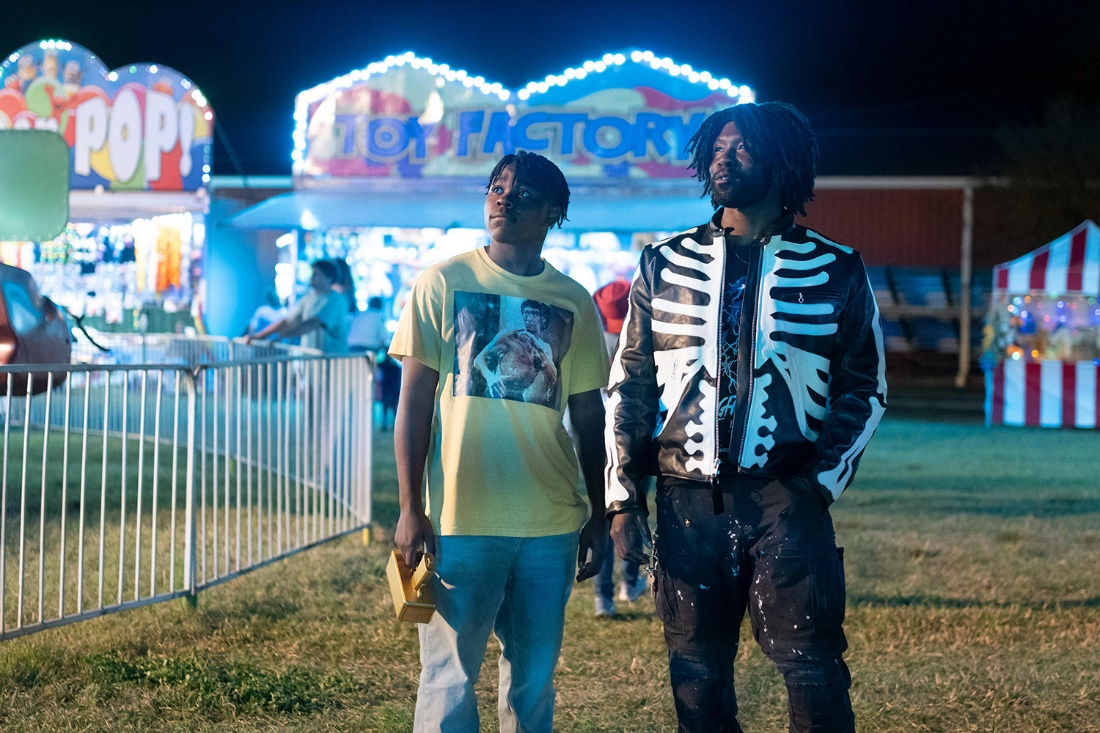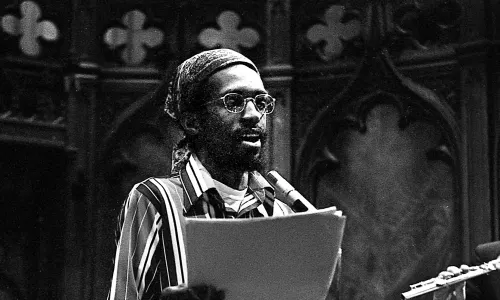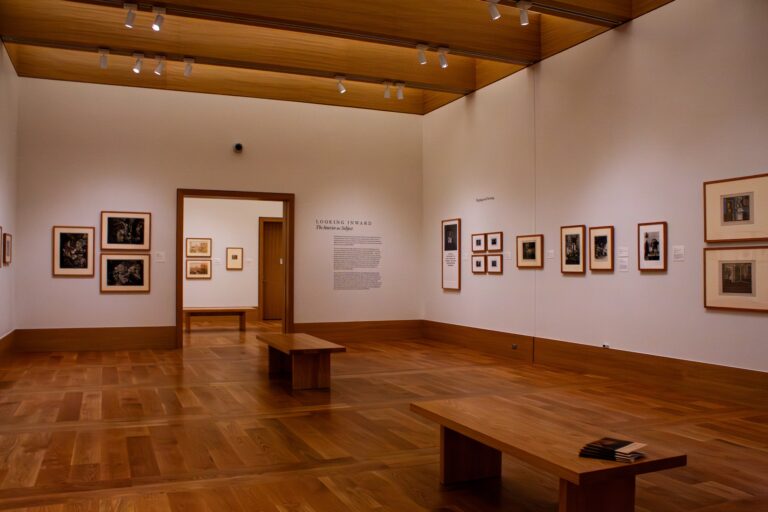“Bruiser,” Directed by Miles Warren ’19, Brings Exploration of Black Masculinity to Film Series

Amid the frigid polar vortex of Friday, Feb. 3, Miles Warren ’19 returned to his alma mater. He wasn’t just coming for old times’ sake, though. Rather, his debut feature film, “Bruiser,” was that evening’s offering at the Wesleyan Film Series. Based on a screenplay that he began working on during his sophomore year at the University, Warren’s film is a moving, intimate interrogation of masculinity, race, and identity.
“Bruiser” centers on Darious (Jalyn Hall), a 14-year-old boy who finds himself grappling with ideas of masculinity. Darious, on summer vacation from his expensive boarding school, finds himself frustrated by his stern father, Malcolm (Shamier Anderson), who admonishes his son to remain on the straight and narrow. After a chance encounter, Darious finds himself drawn to the charismatic, muscular drifter Porter (Trevante Rhodes), who emboldens Darious to learn to defend himself and win fights rather than run from them in the way Malcolm encourages. Meanwhile, Monica (Shinelle Azoroh), Darious’s mother, attempts to mediate the conflicting masculinities that surround her and create a more nurturing environment for her son.
“Bruiser” screened as part of the Film Series’ Black History Month programming. Marc Longenecker, Associate Professor of the Practice in Film Studies and advisor to the Film Board, the student organization that runs the Film Series, explained that he and the Film Board use each February as an opportunity to put on films that showcase a variety of Black experiences.
“It’s an important perspective to give additional prominence [to] during February,” Longenecker said of the Black History Month programming. “But [there’s] the understanding that we’re going to play Black cinema all year.”
Warren explained that the genesis of “Bruiser” came from his reflections on perceptions of Black people in film and popular culture.
“It first came from my interest in WorldStar fight videos,” Warren said, referring to the video aggregator WorldStarHipHop. “They usually depicted Black and Brown men and women getting into these ridiculous altercations. It was very violent and horrific, but it was viewed as comedy in a lot of ways. The idea of an aggressive or violent Black man that you see in media, I think it was a really interesting kind of trope to play with [and see] how that would affect a young Black boy as he comes of age in this turbulent time in his life.”

During a Q&A session after the screening with Assistant Professor of the Practice in Film Studies Mirko Rucnov, Warren pointed out that “Bruiser” features the hard work of several University alumni. Warren co-wrote the screenplay for “Bruiser” with Ben Medina ’19, and remarked that he and Medina first worked out the film’s plot on whiteboards in the Butterfields. Gustavo Sanbria ’19 and Albert Tholen ’15 were among the film’s producers, with Tholen joining Warren during the Q&A. The film’s score, rich with atmospheric tones, was composed by Robert Ouyang Rusli ’10.
Central to the film is the opposition between Malcolm and Porter as role models for Darious. Malcolm, with his pressed shirt and tie, embodies the ideals of meritocracy and hard work. He directs Darious away from conflict, even at the risk of alienating the rambunctious teen. Conversely, Porter is free-spirited and unpredictable, encouraging Darious’ whims, but also bordering on unstable. While the two men have similar backgrounds, both coming from violent pasts, they cope with their experiences in different ways.
“They’re two very different people with the same kind of simmering anger,” Warren said. “[But] the way they hold it in [and] the way they express it is different.”
Longenecker, reflecting on his experience watching “Bruiser” at the Toronto International Film Festival, praised the ambiguous morality of Warren’s film and compared it to the works of director Elia Kazan.
“One of my favorite things about the movie is that you get where every character is coming from,” Longenecker said. “You don’t slap a label on [the characters] as ‘villain’ or ‘hero,’ but understand how a conflict can emerge from the way people are.”
Warren noted that in his experiences screening “Bruiser” for different audiences, some audience members side either with Malcolm or with Porter.
“I’ll get a lot of people who are strongly on one side and don’t even understand why the kid would be swayed by the other side,” Warren said. “Every time that happens, I think it’s interesting because…your values align with this one character and you can’t really step out of that.”
The film’s depth of character is made more impressive by the limited resources Warren had to work with. He explained that “Bruiser” was shot in only 20 days, and those days were even shorter than typical film shoots due to child labor laws, as Hall is present in practically every scene.
Rucnov recounted first observing Warren’s resourcefulness when Warren was his student in “Sight and Sound Workshop” (FILM450) during the Fall 2017 semester, Rucnov’s first at the University. Rucnov explained that for Warren’s final project, he adapted “The Kiss,” an 1887 short story by Anton Chekhov, to take place in a contemporary setting, transforming the large gala setting of the original story into a packed house party.
“He tricks us, making us think that the guy is in a really big party, but in actuality, he only used four actors,” Rucnov said. “Through that project, he really deepened everything we covered that semester.”
Though “Bruiser” is an intimate family drama, Warren’s wide-ranging passion for film and cinema history is palpable. In one scene, Porter reveals a tattoo referencing Stanley Kubrick’s “Dr. Strangelove.” Shots of nighttime neon and motorcycle riding pay homage to Wong Kar-wai’s “Fallen Angels.” In the post-screening Q&A session, Warren acknowledged influences ranging from Charles Laughton’s 1955 noir “The Night of the Hunter” to Adam Sandler’s performance of social anxiety in Paul Thomas Anderson’s “Punch-Drunk Love.” Warren also cited a long list of filmmakers he looks to for inspiration, from Barry Jenkins to Frederico Fellini to Yasujirō Ozu.
“I just want to keep building on what this movie is and keep continuously trying to make stories that are challenging but can exist [as] entertainment as well,” Warren said. “You know, not too arthouse, but not too commercial at the same time. Kind of find that sweet spot where I can reach larger audiences and create these kinds of interesting Black characters that I haven’t seen before.”
“Bruiser” is a deeply felt experience that was positively received by the audience at Film Series. The performances from the small cast embody warmth and nuance, and the cinematography by Justin Derry creates beautiful images with striking chiaroscuro lighting that Warren explained was inspired by the paintings of Francisco Goya. During the Q&A session, conversations continuously flowed from the crowd, keeping Warren and Tholen for well over an hour after the screening concluded.
“It’s beautiful to see that the student that you taught made something out of it,” Rucnov said. “It means what I do has a purpose.”
“Bruiser” will be streaming on Hulu beginning on Feb. 24. In addition to “Bruiser,” this year’s Black History Month programming at the Film Series has featured showings of the recent Marvel blockbuster “Black Panther: Wakanda Forever” and the Eddie Murphy comedy “Coming to America.” The documentary “Zora Neale Hurston: Claiming a Space,” directed by Corwin-Fuller Professor of Film Studies and Co-Director of the Wesleyan Documentary Project Tracy Heather Strain, will screen on Thursday, Feb. 16. On Saturday, Feb. 18, “Mandabi,” a 1968 Senegalese film believed to be the first feature film in an African language, will be shown. Rounding out the Black History Month programming, a double feature of “Tongues Untied” and “No Regret,” two documentaries from director Marlon Riggs focusing on Black queer men, will screen on Feb. 23. The last showing in this program, on Saturday, March 4, will be “Daughters of the Dust,” a 1991 drama focused on the Gullah community in South Carolina that was the first feature film directed by an African American woman to see wide distribution.
Oscar Kim Bauman can be reached at obauman@wesleyan.edu.








Leave a Reply